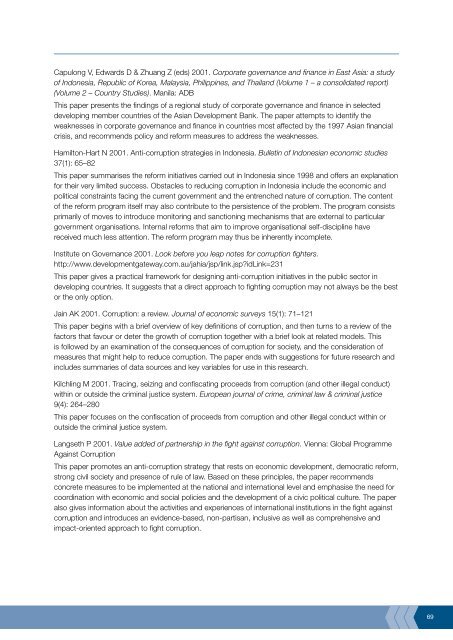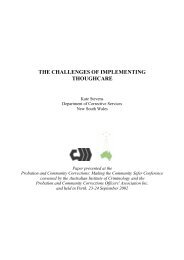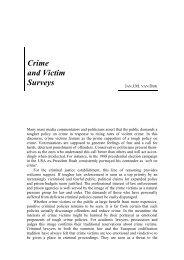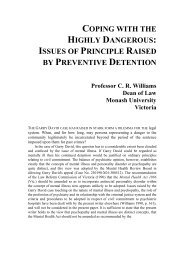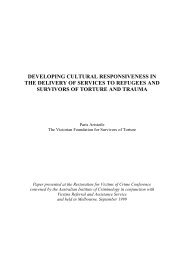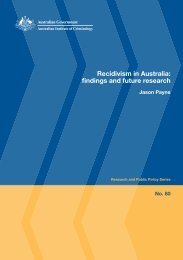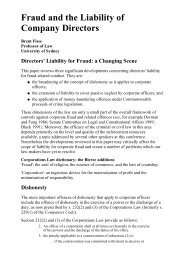Review of anti-corruption strategies Rob McCusker - Australian ...
Review of anti-corruption strategies Rob McCusker - Australian ...
Review of anti-corruption strategies Rob McCusker - Australian ...
Create successful ePaper yourself
Turn your PDF publications into a flip-book with our unique Google optimized e-Paper software.
Capulong V, Edwards D & Zhuang Z (eds) 2001. Corporate governance and finance in East Asia: a study<br />
<strong>of</strong> Indonesia, Republic <strong>of</strong> Korea, Malaysia, Philippines, and Thailand (Volume 1 – a consolidated report)<br />
(Volume 2 – Country Studies). Manila: ADB<br />
This paper presents the findings <strong>of</strong> a regional study <strong>of</strong> corporate governance and finance in selected<br />
developing member countries <strong>of</strong> the Asian Development Bank. The paper attempts to identify the<br />
weaknesses in corporate governance and finance in countries most affected by the 1997 Asian financial<br />
crisis, and recommends policy and reform measures to address the weaknesses.<br />
Hamilton-Hart N 2001. Anti-<strong>corruption</strong> <strong>strategies</strong> in Indonesia. Bulletin <strong>of</strong> Indonesian economic studies<br />
37(1): 65–82<br />
This paper summarises the reform initiatives carried out in Indonesia since 1998 and <strong>of</strong>fers an explanation<br />
for their very limited success. Obstacles to reducing <strong>corruption</strong> in Indonesia include the economic and<br />
political constraints facing the current government and the entrenched nature <strong>of</strong> <strong>corruption</strong>. The content<br />
<strong>of</strong> the reform program itself may also contribute to the persistence <strong>of</strong> the problem. The program consists<br />
primarily <strong>of</strong> moves to introduce monitoring and sanctioning mechanisms that are external to particular<br />
government organisations. Internal reforms that aim to improve organisational self-discipline have<br />
received much less attention. The reform program may thus be inherently incomplete.<br />
Institute on Governance 2001. Look before you leap notes for <strong>corruption</strong> fighters.<br />
http://www.developmentgateway.com.au/jahia/jsp/link.jsp?idLink=231<br />
This paper gives a practical framework for designing <strong>anti</strong>-<strong>corruption</strong> initiatives in the public sector in<br />
developing countries. It suggests that a direct approach to fighting <strong>corruption</strong> may not always be the best<br />
or the only option.<br />
Jain AK 2001. Corruption: a review. Journal <strong>of</strong> economic surveys 15(1): 71–121<br />
This paper begins with a brief overview <strong>of</strong> key definitions <strong>of</strong> <strong>corruption</strong>, and then turns to a review <strong>of</strong> the<br />
factors that favour or deter the growth <strong>of</strong> <strong>corruption</strong> together with a brief look at related models. This<br />
is followed by an examination <strong>of</strong> the consequences <strong>of</strong> <strong>corruption</strong> for society, and the consideration <strong>of</strong><br />
measures that might help to reduce <strong>corruption</strong>. The paper ends with suggestions for future research and<br />
includes summaries <strong>of</strong> data sources and key variables for use in this research.<br />
Kilchling M 2001. Tracing, seizing and confiscating proceeds from <strong>corruption</strong> (and other illegal conduct)<br />
within or outside the criminal justice system. European journal <strong>of</strong> crime, criminal law & criminal justice<br />
9(4): 264–280<br />
This paper focuses on the confiscation <strong>of</strong> proceeds from <strong>corruption</strong> and other illegal conduct within or<br />
outside the criminal justice system.<br />
Langseth P 2001. Value added <strong>of</strong> partnership in the fight against <strong>corruption</strong>. Vienna: Global Programme<br />
Against Corruption<br />
This paper promotes an <strong>anti</strong>-<strong>corruption</strong> strategy that rests on economic development, democratic reform,<br />
strong civil society and presence <strong>of</strong> rule <strong>of</strong> law. Based on these principles, the paper recommends<br />
concrete measures to be implemented at the national and international level and emphasise the need for<br />
coordination with economic and social policies and the development <strong>of</strong> a civic political culture. The paper<br />
also gives information about the activities and experiences <strong>of</strong> international institutions in the fight against<br />
<strong>corruption</strong> and introduces an evidence-based, non-partisan, inclusive as well as comprehensive and<br />
impact-oriented approach to fight <strong>corruption</strong>.


